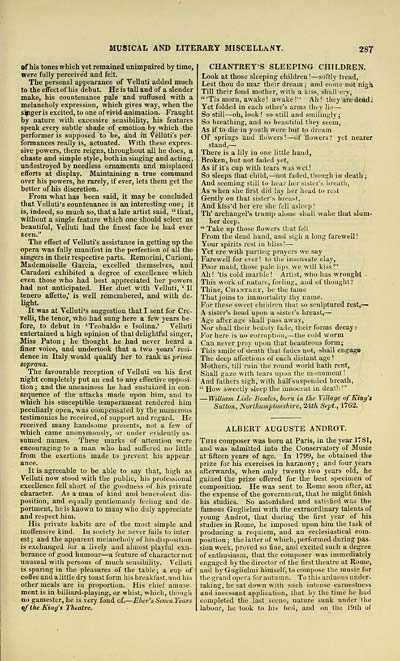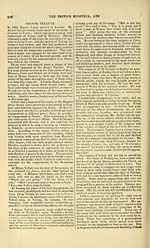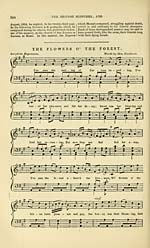Glen Collection of printed music > Printed music > British minstrel, and musical and literary miscellany
(295) Page 287
Download files
Complete book:
Individual page:
Thumbnail gallery: Grid view | List view

MUSICAL AND LITERARY MISCELLANY.
287
of bis tones which vet remained unimpaired by time,
were fully perceived and felt.
The personal appearance of Velluti added much
to the effect of his debut. He is tall and of a slender
make, his countenance pale and suffused with a
melancholy expression, which gives way, when the
sipger is excited, to one of vivid animation. Fraught
by nature with excessive sensibility, his features
speak every subtle shade of emotion by which the
performer is supposed to be, and in Velluti's per.
formances really is, actuated. With these expres-
sive powers, there reigns, throughout all he does, a
chaste and simple style, both in singing and acting,
undestroyed by needless ornaments and misplaced
efforts at display. Maintaining a true command
over his powers, he rarely, if ever, lets them get the
better of his discretion.
From what has been said, it may be concluded
that Velluti's countenance is an interesting one ; it
is, indeed, so much so, that a late artist said, "that,
without a single feature which one should select as
beautiful, Velluti had the finest face he had ever
seen."
The effect of Velluti's assistance in getting up the
opera was fully manifest in the perfection of all the
singers in their respective parts. Remorini, Curioni,
Mademoiselle Garcia, excelled themselves, and
Caradori exhibited a degree of excellence which
even those who had best appreciated her powers
had not anticipated. Her duet with Velluti, ' II
tenero affetto,' is well remembered, and with de-
light
It was at Velluti's suggestion that I sent for Cre-
velli, the tenor, who had sung here a few years be-
fore, to debut in 'Teobaldo e Isolina.' Velluti
entertained a high opinion of thatdelightftil singer,
Miss Paton ; he thought he had never heard a
finer voice, and undertook that a two years' resi-
dence in Italy would qualify her to rank as prima
soprano.
The favourable reception of Velluti on his first
night completely put an end to any effective opposi-
tion ; and the uneasiness he had sustained in eon-
sequence of the attacks made upon him, and to
which his susceptible temperament rendered him
peculiarly open, was compensated by the numerous
testimonies he received, of support and regard. He
received many handsome presents, nut a few of
which came anonymously, or under evidently as-
sumed names. These marks of attention were
encouraging to a man who had suffered no little
from the exertions made to prevent his appear-
ance.
It is agreeable to be able to say that, high as
Velluti now stood with the public, his professional
excellence fell short of the goodness of his private
character. As a man of kind and benevolent dis-
position, and equally gentlemanly feeling and de-
portment, he is known to many wlao duly appreciate
and respect him.
His private habits are of the most simple and
inoffensive kind. In society he never fails to inter-
est ; and the apparent melancholy of his disposition
is exclianged for a lively and almost playful exu-
berance of good humour — a feature of character not
unusual with persons of much sensibility. Velluti
is sparing in the pleasures of the table ; a cup of
coffee and a little dry toast form his breakfast, and his
other meals are in proportion. His chief amuse-
ment is in billiard-playing, or whist, which, thuugli
no gamester, he is very fond ol.—£bcr's Scvm Years
of the King's Tlieatre.
CHANTREY'S SLEEPING CHILDREN.
Look at those sleeping children ! — softly tread.
Lest thou do mar their dream; and come not nigh
Till their fond mother, with a kiss, shall cry,
"'Tis morn, awake! awake!" Ah! they are deadi
Yet folded in each other's arms thiy lio —
So still — oh, look I so still and smilingly;
So breathing, and so beautiful they seem,
As if to die in youth were but to dream
Of springs and flowers !— of flowers? yet nearer
stand, —
There is a lily in one little hand,
Broken, but not faded yet.
As if it's cup with tears was wet!
So sleeps that child, — not faded, though in death;
And seeming still to hear her sister's breath,
As when she first did lay her head to rest
Gently on that sister's breast,
And kiss'd her ere she fell asleep !
Th' archangel's trump alone shall wake that slum-
ber deep.
" Take up those flowers that fell
From the dead hand, and sigh a long farewell!
Your spirits rest in bliss ! —
Yet ere with parting prayers we say
Farewell for ever! to the insensate clay,
Poor maid, those pale lips we will kiss!"
Ah! 'tis cold marble! Artist, who has wrought .
This work of nature, feeling, and of thought?
Thine, Cuantkey, be the lame
That joins to immortidity thy name.
For these sweet children that so sculptured rest,—
A sister's head upon a sister's breast, —
Age after age shall pass away.
Nor shall their beauty fade, their forms decay:
For here is no corruption, — the ei>ld worm
Can never prey upon that beauteous form;
This smile of death that fades not, shall engage
The deep affections of each distant age !
Mothers, till ruin the round world hath rent.
Shall gaze with tears upon the monument !
And fathers sigh, with half suspended breath,
" How sweetly sleep the innocent in death !"
— William Lisle Bowles, born in the Village of Kiny't
Sutton, Northamptonshire, 24.th Sept., 1762.
ALBERT AUGUSTE ANDROT.
This composer was born at Paris, in the year 1781,
and was admitted into the Conservatory of Music
at fifteen years of age. In 1799, he obtained the
prize for his exercises in harmony; and four years
afterwards, when only twenty two years old, he
gained the prize offered for the best specimen of
composition. He was sent to Rome soon after, at
the expense of the government, that he might finish
his studies. So astonished and satisfied was the
famous Guglielmi with the extraordinary talents of
young Androt, that during the first year of bis
studies in Rome, he imposed upon him the task of
producing a requiem, and an ecclesiastical com-
position ; the latter of which, performed during pas-
sion week, proved so fine, and excited such a degree
of enthusiasm, that the composer was immediately
engaged by the director of the first theatre at Rome,
and by Guglielmi himself, to compose the music for
the grand opera for autumn. To this arduous under-
taking, he sat down with such intense earnestness
and incessant ai)plieation, that by the time he had
completed the last scene, nature simk under the
labour, he took to his bed, and (Ui the 19th ol
287
of bis tones which vet remained unimpaired by time,
were fully perceived and felt.
The personal appearance of Velluti added much
to the effect of his debut. He is tall and of a slender
make, his countenance pale and suffused with a
melancholy expression, which gives way, when the
sipger is excited, to one of vivid animation. Fraught
by nature with excessive sensibility, his features
speak every subtle shade of emotion by which the
performer is supposed to be, and in Velluti's per.
formances really is, actuated. With these expres-
sive powers, there reigns, throughout all he does, a
chaste and simple style, both in singing and acting,
undestroyed by needless ornaments and misplaced
efforts at display. Maintaining a true command
over his powers, he rarely, if ever, lets them get the
better of his discretion.
From what has been said, it may be concluded
that Velluti's countenance is an interesting one ; it
is, indeed, so much so, that a late artist said, "that,
without a single feature which one should select as
beautiful, Velluti had the finest face he had ever
seen."
The effect of Velluti's assistance in getting up the
opera was fully manifest in the perfection of all the
singers in their respective parts. Remorini, Curioni,
Mademoiselle Garcia, excelled themselves, and
Caradori exhibited a degree of excellence which
even those who had best appreciated her powers
had not anticipated. Her duet with Velluti, ' II
tenero affetto,' is well remembered, and with de-
light
It was at Velluti's suggestion that I sent for Cre-
velli, the tenor, who had sung here a few years be-
fore, to debut in 'Teobaldo e Isolina.' Velluti
entertained a high opinion of thatdelightftil singer,
Miss Paton ; he thought he had never heard a
finer voice, and undertook that a two years' resi-
dence in Italy would qualify her to rank as prima
soprano.
The favourable reception of Velluti on his first
night completely put an end to any effective opposi-
tion ; and the uneasiness he had sustained in eon-
sequence of the attacks made upon him, and to
which his susceptible temperament rendered him
peculiarly open, was compensated by the numerous
testimonies he received, of support and regard. He
received many handsome presents, nut a few of
which came anonymously, or under evidently as-
sumed names. These marks of attention were
encouraging to a man who had suffered no little
from the exertions made to prevent his appear-
ance.
It is agreeable to be able to say that, high as
Velluti now stood with the public, his professional
excellence fell short of the goodness of his private
character. As a man of kind and benevolent dis-
position, and equally gentlemanly feeling and de-
portment, he is known to many wlao duly appreciate
and respect him.
His private habits are of the most simple and
inoffensive kind. In society he never fails to inter-
est ; and the apparent melancholy of his disposition
is exclianged for a lively and almost playful exu-
berance of good humour — a feature of character not
unusual with persons of much sensibility. Velluti
is sparing in the pleasures of the table ; a cup of
coffee and a little dry toast form his breakfast, and his
other meals are in proportion. His chief amuse-
ment is in billiard-playing, or whist, which, thuugli
no gamester, he is very fond ol.—£bcr's Scvm Years
of the King's Tlieatre.
CHANTREY'S SLEEPING CHILDREN.
Look at those sleeping children ! — softly tread.
Lest thou do mar their dream; and come not nigh
Till their fond mother, with a kiss, shall cry,
"'Tis morn, awake! awake!" Ah! they are deadi
Yet folded in each other's arms thiy lio —
So still — oh, look I so still and smilingly;
So breathing, and so beautiful they seem,
As if to die in youth were but to dream
Of springs and flowers !— of flowers? yet nearer
stand, —
There is a lily in one little hand,
Broken, but not faded yet.
As if it's cup with tears was wet!
So sleeps that child, — not faded, though in death;
And seeming still to hear her sister's breath,
As when she first did lay her head to rest
Gently on that sister's breast,
And kiss'd her ere she fell asleep !
Th' archangel's trump alone shall wake that slum-
ber deep.
" Take up those flowers that fell
From the dead hand, and sigh a long farewell!
Your spirits rest in bliss ! —
Yet ere with parting prayers we say
Farewell for ever! to the insensate clay,
Poor maid, those pale lips we will kiss!"
Ah! 'tis cold marble! Artist, who has wrought .
This work of nature, feeling, and of thought?
Thine, Cuantkey, be the lame
That joins to immortidity thy name.
For these sweet children that so sculptured rest,—
A sister's head upon a sister's breast, —
Age after age shall pass away.
Nor shall their beauty fade, their forms decay:
For here is no corruption, — the ei>ld worm
Can never prey upon that beauteous form;
This smile of death that fades not, shall engage
The deep affections of each distant age !
Mothers, till ruin the round world hath rent.
Shall gaze with tears upon the monument !
And fathers sigh, with half suspended breath,
" How sweetly sleep the innocent in death !"
— William Lisle Bowles, born in the Village of Kiny't
Sutton, Northamptonshire, 24.th Sept., 1762.
ALBERT AUGUSTE ANDROT.
This composer was born at Paris, in the year 1781,
and was admitted into the Conservatory of Music
at fifteen years of age. In 1799, he obtained the
prize for his exercises in harmony; and four years
afterwards, when only twenty two years old, he
gained the prize offered for the best specimen of
composition. He was sent to Rome soon after, at
the expense of the government, that he might finish
his studies. So astonished and satisfied was the
famous Guglielmi with the extraordinary talents of
young Androt, that during the first year of bis
studies in Rome, he imposed upon him the task of
producing a requiem, and an ecclesiastical com-
position ; the latter of which, performed during pas-
sion week, proved so fine, and excited such a degree
of enthusiasm, that the composer was immediately
engaged by the director of the first theatre at Rome,
and by Guglielmi himself, to compose the music for
the grand opera for autumn. To this arduous under-
taking, he sat down with such intense earnestness
and incessant ai)plieation, that by the time he had
completed the last scene, nature simk under the
labour, he took to his bed, and (Ui the 19th ol
Set display mode to: Large image | Transcription
Images and transcriptions on this page, including medium image downloads, may be used under the Creative Commons Attribution 4.0 International Licence unless otherwise stated. ![]()
| Special collections of printed music > Glen Collection of printed music > Printed music > British minstrel, and musical and literary miscellany > (295) Page 287 |
|---|
| Permanent URL | https://digital.nls.uk/91438485 |
|---|
| Description | Scottish songs and music of the 18th and early 19th centuries, including music for the Highland bagpipe. These are selected items from the collection of John Glen (1833 to 1904). Also includes a few manuscripts, some treatises, and other books on the subject. |
|---|
| Description | The Glen Collection and the Inglis Collection represent mainly 18th and 19th century Scottish music, including Scottish songs. The collections of Berlioz and Verdi collected by bibliographer Cecil Hopkinson contain contemporary and later editions of the works of the two composers Berlioz and Verdi. |
|---|

